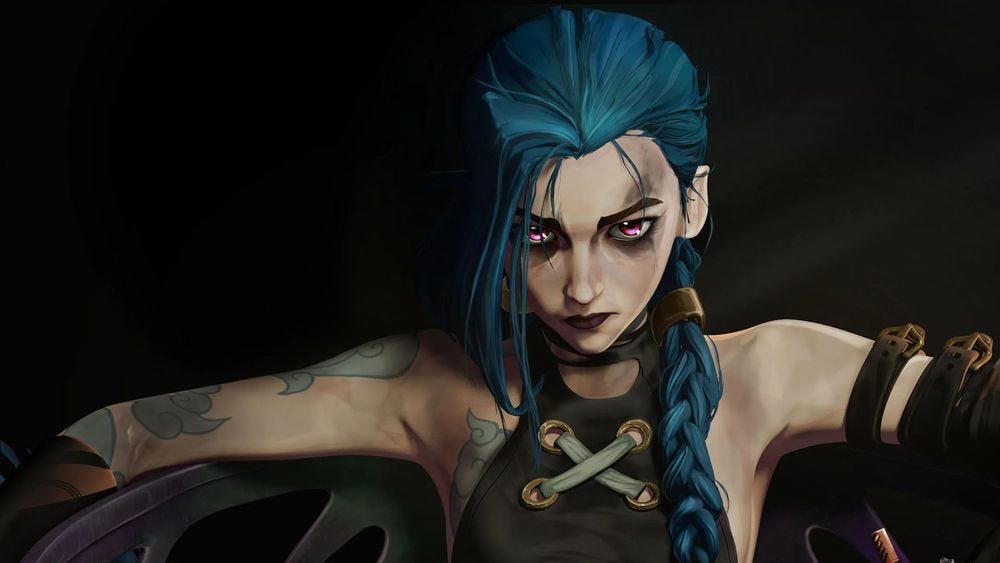Arcane's runaway budget represents the peril of turning a gaming studio into a multimedia titan
Developing, rather than licencing, is a taxing endeavour.
In a purely creative regard, Riot Games’ Arcane - an adaptation of their ubiquitous League of Legends franchise - is a sterling success. Delivered on Netflix in three distinct acts throughout November 2021, the series received universal acclaim for its painterly craft and commitment to characterisation, colouring the periphery shades of its source material in kind. After winning Outstanding Animated Program at the 2022 Emmys, its critical renown stood upon a tantamount scale to its consumer reception: Netflix reported the series reached number one on its service within eighty-five countries. A contemporaneous report featured a claim from erstwhile Riot CEO Nicolo Laurent that gaming companies will be “the mass market of tomorrow” - author Nicole Laporte likens this to the century of dominance exhibited by an entertainment conglomerate in Disney. Granted, this will inevitably come to pass; revenue generated within the industry this year has reached $455 billion. Nevertheless, legacy media retains an ellusive currency raw revenue cannot approximate: the gilded adoration of Hollywood.
Arcane is Riot’s first and only foray into the gladiatorial arena of Hollywood.
Netflix, whose constitution resembles a tech company rather than a traditional film house, emerged as the great disruptors of the entertainment industry a decade ago. Their lone peer in this space is Amazon, who acquired MGM to add an extra three characters of prestige to their name - the former, however, proudly bear their suffix. Thus, a partnership with Riot on Arcane was a fruitful calculation: their online distribution aligned neatly with the studio’s own worldwide scope. Prospective viewers were met with sponsored content not only through Riot’s own platform, but a series of global stunts designed to propagate through social media. One could easily segue from Instagram to their Netflix app, or jump from an article on their laptops to the League of Legends launcher - Riot had full command of two demographics.
Per an investigation from Variety, Arcane’s eighteen episodes commanded a budget of $250 million - a figure representing the culmination of five years’ worth of research, development, and resetting. Co-founder and chief product officer Marc Merrill defended his team, affirming their ambition was not to “operate like a traditional studio with traditional timelines”. However, Merrill conceded that “getting it right takes a lot more time than we’d expected”, leading to a “recalibration” of their integrated production pipeline. Reporter Andrew Wallenstein attributed the series’ lavish budget to an extensive advertising campaign: Riot invested $60 million of their own funds into marketing, a far greater sum than their partners in Netflix. Evidently, this raised awareness to an effective end - it is, however, unsustainable against Netflix’s fixed licencing fee and unilateral compensation, which precludes additional revenue from consumer purchases, advertisers, and residuals.
Riot spared no expense in raising Arcane’s advertising profile, delivering gaudy exhibitions the world over.
Essentially, Riot are manufacturing a hit on Netflix’s terms: a loss leader to raise League of Legends’ already astronomical profile. Conversely, their attempt to turn the game into a feature film drew upon commercial titans in Joe and Anthony Russo: known for their proficiency in portraying paintball, Avengers, and grifting studios through their pedestrian adventures in espionage - Citadel and The Grey Man both arrived at great expenditure and to little enthusiasm. Upon reconsidering the direction of the project, Riot parted with the Russos to the tune of $5 million; this payout separated the company from a dissatisfactory script. Evidently, the Russos know the creative development game greater than Riot: the Bros. package their titles through their AGBO banner, before settling upon a suitable home. Rather than incubating a concept themselves, then sending it out to market, Riot brought in a third-party to build a feature from scratch - getting cold feet as its development heats up will come at a great cost.
Indeed, Riot have a preternatural understanding of fostering indelible gaming concepts: League of Legends’ sibling in Valorant reserves a rich, active audience, in tandem with a similarly cell-shaded aesthetic to Arcane. Condensing these properties into a contained narrative is counter to the ethos of sustained play the studio was founded upon - evinced through internal tension between the feature and development teams. In 2020, former Netflix marketing and publicity VP Shauna Spenley was annointed as Riot’s inaugural Global President of Entertainment; her responsibilities were antithetical to the gaming team’s priorities, who believed entertainment to be a “distraction from the company’s core competencies”. Furthermore, Riot’s founders in Merrill and Brandon Beck were reluctant to sanction a full slate of development, wanting to retain their high creative standards throughout each production.
Valorant’s fantasy flourishes would translate effectively to a kinetic animated project.
In January of this year, Riot laid off 530 members of their team - 11% of their total workforce. In August, Spenley left her post in favour of Warner Bros. Discovery’s Max platform; a further 27 members of the League of Legends development class and five from their publishing division were let go. Against Arcane’s total revenue of $108 million - $3 million per episode from both Netflix and Tencent - the series ultimately represents a financial folly, rather than a furthering of their nascent multimedia empire. Though its second season will benefit from ancillary sales of in-game items and physical merchandise, its prospects are limited to breaking even, rather than profiting.
Promisingly, Merrill noted the studio has acquired a season’s worth of screenplays set within the League of Legends canon from writer Justin Piasecki, penned under their purview. However, against a struggling labour climate and potential tariff tension in the tech sector, relying upon film and television as an exercise in PR may be a pyrrhic battle for the team. Riot’s most apt course correction is through licencing their content, rather than developing programmes internally. Indeed, there is a risk of studios perceiving the projects as less of a priority than themselves, yet the benefit of established production structures lessens the stress upon the studio. Still, their Emmy must be a shining emblem of authority within their lobby.






